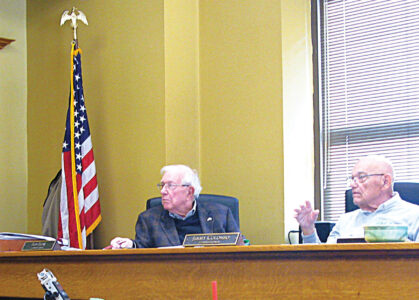Residents cautioned over gas heaters
PARKERSBURG – Residents using natural gas-powered, wall-mounted heaters were cautioned to perform annual inspections and be reminded of the dangers these devices pose, according to the Parkersburg Fire Department.
The natural shifting and settling of a home during the year can cause the seals on natural gas lines to leak, said Parkersburg Fire Captain Tim Flinn.
This same settling can cause leaks in the ventilation of wall-mounted heaters, resulting in natural gas or carbon monoxide being vented into the structure instead of to the outdoors, he said.
A professional should be hired every year to inspect all central natural gas heaters, as well as all wall-mounted natural gas-powered heaters before they are used for the season, said Flinn. A professional knows how to check that all vents, seals, and connections are secure, and to keep the heater in good working order.
If installed incorrectly, damaged, or used without proper ventilation, these gas-powered wall-mounted heaters can be a source of house fires and cause carbon monoxide to fill the area they are being used to heat, said Flinn.
“The Parkersburg Fire Department has experienced several structure fires involving gas wall and electric space heaters that resulted in loss of life,” said Flinn. “It becomes difficult to determine if the heater malfunctioned or if items were too close to these heaters as an exact cause of the fire.”
All items should be kept at least three feet away from all heating sources, regardless of their fuel or power source, at all times, said Flinn.
Any item within this zone is at high risk of catching on fire, which will spread through the home in minutes.
The wall-mounted heaters are an efficient source of heat for sections of a structure that are not directly connected to the primary heating system, said Flinn. However, they should always be used in conjunction with a carbon monoxide detector, regardless of the type of building they are being used in, he said.
Natural gas-powered heat sources should only be considered for detached buildings on your property that only require heating when they are actively being used, such as garages or out buildings, said Flinn.
Every rented property in West Virginia, including hotels and business rentals, is required to have a carbon monoxide detector on the premises, said Flinn. The use of unvented gas-powered heaters is prohibited in public buildings in West Virginia. Many states have banned the use of unvented gas-powered heaters and combustible fuels such as kerosene, said Flinn.
When purchasing a gas-powered heater, you should make sure the unit has a Underwriters Laboratories mark on it, which appears as a UL symbol, Flinn said. This mark means that the unit has been tested by a professional safety company in compliance with Underwriters Laboratory standards.
Only those units with fully-sealed combustion or marked as “100 percent outdoor air” should be used for the best safety measures in the home, said Flinn. The more expensive models often have better safety features, he said.
It is important that your gas-powered heater, whether vented or unvented, be installed by a professional, Flinn said. A poor connection to your home’s gas line, an improper seal, or an incorrectly installed vent can cause carbon monoxide to leak into your home. This can easily turn into a fatal problem, he said.






